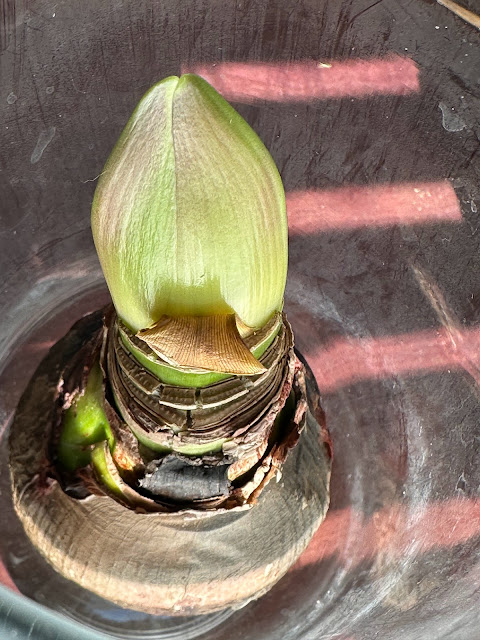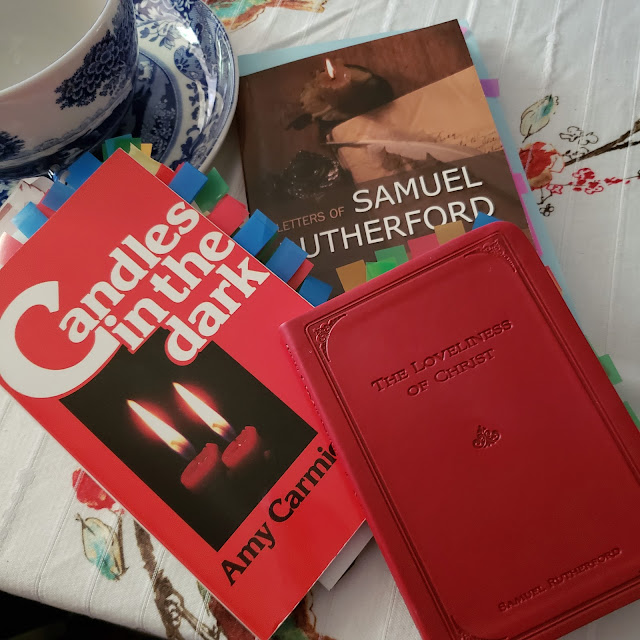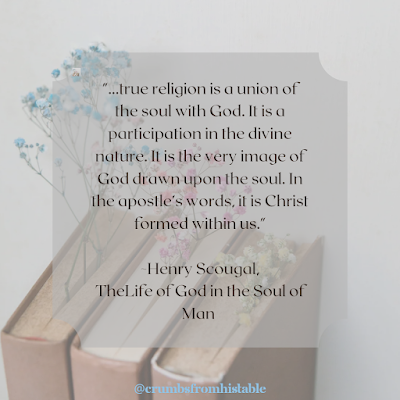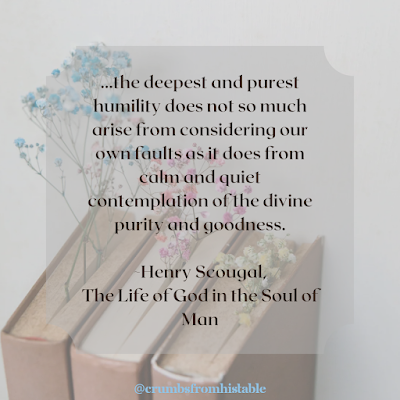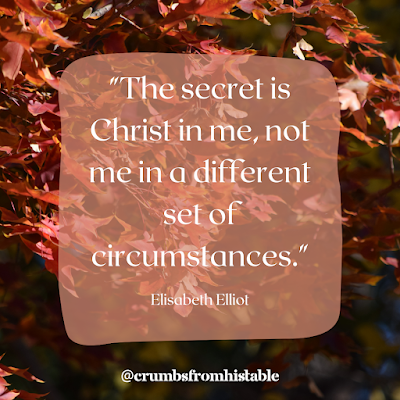In sacrifice and offering you have
not delighted,
but
you have given me an open ear.
Burnt
offering and sin offering
you
have not required (Psalm 40:6, ESV).
For
you will not delight in sacrifice, or I would give it;
you
will not be pleased with a burnt offering.
The
sacrifices of God are a broken spirit;
a
broken and contrite heart, O God, you
will not despise (Psalm 51:16–17, ESV).
 |
| Raindrops and ants on Easter lily bloom |
Mom and I are still practicing our Wednesday Bible
study time, but her capacity has changed so much that it currently consists of
watching an Elisabeth Elliot talk from the Elisabeth Elliot Foundation YouTube
channel. Sometimes we discuss it after; sometimes we don’t. Every day her capacity is
unpredictably different now, even as the overall trajectory is
decline.
Watching “Betty” week after week as we are doing,
certain themes and stories arise from her talks. The themes of surrender,
obedience, and the cross are no surprise to me; those have been hallmarks of
all her teaching and writing. I did not, however, recall how important and
painful her first year of missionary service was, yet she has told this story
many times in the talks we’ve viewed.
After many years of preparation and discernment, a
young Elisabeth Elliot began serving as a Bible translator and linguist in Ecuador.
Jim, whom she loved but to whom she was not yet engaged, was also serving in
Ecuador but on the other side of the country. She poured her heart into
learning and developing a script for the Colorado people’s language in order to
translate the Bible into their heart tongue. During that first year, she
suffered “three great losses”:
1. Her
language informant—literally the only human who knew both Spanish and Colorado
and thus was suitable to assist her in decoding and translating the language—was
brutally murdered.
2. Jim’s
whole mission station washed down Amazon in a flood. This included 5 buildings—2
built by him and 3 redone by him—and 500 hand-planed boards, by themselves representing
500 person-days of labor.
3. Every
single page of her translation materials were stolen from the 2 colleagues
succeeding her in Colorado Bible translation work. Her entire year’s labor was
instantly gone and irreplaceable
Of the 3 languages she worked on in Bible
translation over her missionary career, none of her work amounted to any
progress toward Bible translations, but it did work on her character formation.
She said, “These were the kindergarten lessons that prepared me for 1956 when
the 5 were martyred. And again, “Results are God’s business, not ours.”
In recounting this story, she recited (by heart) an
Amy Carmichael poem, “Strange Ashes.” It compares the Christian life to a whole
burnt offering, the one offering prescribed in the Old Testament in which every
clean part of the animal was burned to ashes on the altar.[i] None
was set aside for the priests and Levites. None was given back to the worshiper
in a fellowship meal. This was the offering representing the whole-hearted
surrender of the worshiper. Here is Amy’s poem:
But these
strange ashes, Lord? this nothingness,
This baffling sense of loss?
“Son, was the
anguish of My stripping less
Upon the torturing Cross?
“Was I not
brought into the dust of death,
A worm, and no man, I?
Yea, turned to
ashes by the vehement breath
Of fire—on Calvary?
“O son beloved,
this is thy heart’s desire:
This and no other thing
Follows the fall
of the Consuming Fire
On the burnt offering.
“Go now and
taste the joy set high, afar—
No joy like that for thee—
See how it
lights thy way like some great star.
Come now and follow Me.”[ii]
Elisabeth had long ago surrendered her life
fully to the Lord. This poem was her way of reminding herself not to be
surprised when ashes were the result, even ashes of her service offered to Him.
Peter wrote to the suffering Jewish Christians in Asia Minor, “Beloved, do not
be surprised at the fiery trial when it comes upon you to test you, as though
something strange were happening to you. But rejoice insofar as you share
Christ’s sufferings, that you may also rejoice and be glad when his glory is
revealed” (1 Peter 4:12–13, ESV).
Yet we are surprised, aren’t we?
When Amore and I moved to Thailand to begin
what we thought was a lifelong vocation as missionaries…
After years of discernment, education, and
confirmation of our direction from the church…
After months of raising prayer and financial
support…
After purging our books and other possessions
to travel as light as possible…
We spent much of our year in Thailand in
hospital medical offices, trying without success to find answers to my sudden,
severe fatigue, dizziness, hand pain, butterfly rash across my cheeks, and
abnormal lab results. We felt we knew the right label for the complex of
symptoms, but we eventually reached the painful conclusion that the Lord was
using my illness to lead us back to our home state, doctors who knew me, and
family to support us.
Years of preparation and prayer, years of
training leaders in southeast Asia, months of learning Thai, to what end?
Strange ashes, indeed.
That path back home began to topple a complex
array of dominoes, leading to some happy providences like the Tuesday Night
Tangent Society Bible study for high school students and our availability to
support our aging parents and ailing siblings. It also led to very, very hard
providences and proved my own primary school preparation for them.
When I, like Elisabeth, claimed missionary
martyr Betty Scott Stam’s youthful prayer as my own, did I mean it?
“Lord,
I give up all my own plans and purposes,
All my own desires and hopes,
And accept Thy will for my life.
I give myself, my life, my all,
Utterly to Thee, to be Thine forever!
Fill me and seal me with Thy Holy Spirit.
Use me as Thou will,
Send me where Thou will,
And work out Thy whole will in my life,
At any cost, now and forever!”
—Betty Scott Stam, as quoted by Elisabeth
Elliot in multiple talks
I confess I never thought “Thy whole will…at
any cost” meant
·
3 of my joints braced every day (with a
personal worst of 9 joints braced at once),
·
hiking boots instead of ballet flats,
·
swallowing 47 pills on an average Tuesday,
·
dozens of hours and 4 professional health
advocates (so far) trying to solve the mystery of the disappearing deductible,
·
never leaving home without a large tote back of
the cushions and props my chronic pain requires to sit comfortably anywhere,
·
an average of a surgery a year,
·
dying to my natural fear of needles and
learning to inject medicine into my abdomen myself,
·
the shame of rerouting the entire team
intending to join us in southeast Asia,
·
my husband working a computer job to earn our
bread and provide my insurance, instead of the two of us co-laboring for the
gospel and training Christian leaders side by side,
·
constant calculus of risk versus benefits of
activities other people take for granted,
·
and praying daily, “I can’t do this. Will You
please help me?”
Glamour and prestige are altogether absent from
life with chronic illness. The disabled often go unseen and unnoticed, “buried
with Christ.” But there is One who sees. We are never beyond His notice. He
says His grace comes to its fullest expression in weakness, and these light and
fleeting afflictions are actively generating for us an eternal weight of glory
that surpasses our best imaginings (2 Corinthians 12:9-10; 4:17-18).
When union with Christ means “strange ashes”
and fellowship with the Man of Sorrows in shared suffering, I must examine
myself before the Lord and return to my starting place in the faith: the
Scriptures and the garden of Gethsemane,[iii]
the “olive press.” Jesus was pressed there, pressed to the point of perspiring
blood. All who truly desire to follow Him will at some point, likely many
points, face their own Gethsemanes. Charles Spurgeon wrote of Joseph “The
greater the blessing, the greater the trial that will precede it.” Scottish
minister James Stewart said, “In love’s service, only the wounded soldiers can
serve.”[iv]
Loving the Triune God by presenting my body
and, indeed, my whole self as a living sacrifice (Romans 12:1-2) means searing
flames, strange ashes, and more and more of me being transfigured into more and
more of Him. His fellowship in the flames is our comfort and sustenance. Even,
in the mysterious alchemy of grace, our joy.
“Go
now and taste the joy set high, afar—
No
joy like that for thee—
See
how it lights thy way like some great star.
Come
now and follow Me.”
[i]
Genesis 22:1-13; Exodus 29:18-42; Leviticus 1.
[iii]
Matthew 26:36; Mark 14:32.
[iv] Quoted by John Piper, “Solid Joys” email devotional, March 6,
2018.


